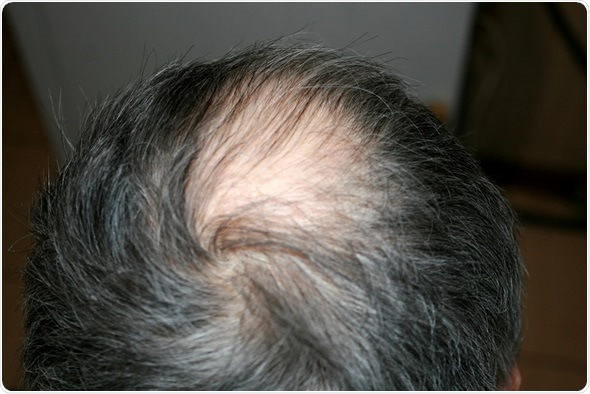
Contents
Signs and Symptoms of Drug-Induced Alopecia
The hair loss that occurs as a result of medication use can affect all hair growing on the body. The scalp is the most commonly affected area, although patients commonly report the loss of hair from their eyebrows and eyelashes, particularly for those who are being treated with chemotherapy.
The effects typically begin several weeks after the initiation of the therapy that causes hair loss. Research on women who have chemotherapy to treat breast cancer has found that alopecia could begin as early as two weeks after the first treatment for some women. On average, hair loss began 4-5 weeks after treatment initiation.
Types of Drug-Induced Alopecia
There are two main types of drug-induced hair loss:
- Anagen effluvium: the loss of actively growing hair, which usually occurs due to chemotherapy medications or overdose of arsenic, bismuth, thallium, boric acid, gold or colchicine
- Telogen effluvium: loss of resting or bulb hair, which is more common and can occur due to many different medications
Anagen effluvium typically occurs more quickly after the initiation of the medication, whereas telogen effluvium can take several months for the effects to become evident.
Medications
There are many medications that can cause hair loss in some individuals, without causing any problems in most other people.
Anticoagulant medications such as heparin and warfarin have rare side effects of causing hair loss. Additionally, antihypertensive medications such as beta-blocker drugs (e.g. atenolol, metoprolol) and ACE inhibitors (e.g. perindopril, lisinopril) may also occasionally lead to hair loss in some patients.
Medications that alter the levels of hormones in the body may also be linked to hair loss in some patients. This includes the oral contraceptive pill, hormone replacement therapy and androgen therapy.
There are also some anticonvulsant medications, such as valproic acid, carbamazepine and phenytoin, and antidepressant drugs such as lithium that may be linked alopecia.
Other drugs that can sometimes cause hair loss include:
- Cimetidine
- Retinoids (e.g. acitretin)
- Antithyroid drugs
- Amphetamines
- Non-steroidal anti-inflammatory drugs (NSAIDs)
- Bromocriptine
- Levodopa
- Tricyclic antidepressants (e.g. amitriptyline)
Other Causes of Alopecia
It is important to realize that medication use is not the only possible cause of hair loss and some individuals may experience symptoms for a different reason. Other possible causes include:
- Recent illness
- Recent surgery
- Poor diet
- Patterned androgenetic hair loss
Diagnosis of Drug-Induced Alopecia
There are several steps to make a diagnosis of drug-induced alopecia and decide on the appropriate course of action.
Firstly, a comprehensive medical history should be taken, including all medication doses and changes. This should be observed alongside the reported symptoms and the date that the hair loss began. Most medications that cause hair loss are initiated or the dose is increased within 3 months of the symptoms.
If there is a suspected case of hair loss due to medication use, the best way to confirm the diagnosis is to cease the possible offender for 3 months or more and to observe any regrowth of the hair.
However, in some cases, such as chemotherapy for cancer treatment, the benefits of therapy usually outweigh the negative effects associated with alopecia. In this instance, it is recommended to continue the therapy and wait for the conclusion of therapy for the hair to grow back. The therapeutic decision will depend on the individual case.
[“source-ndtv”]
